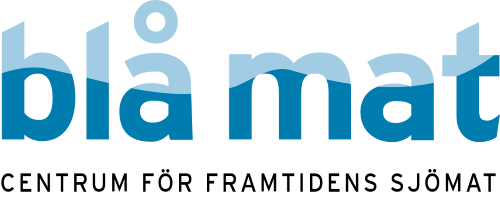During the last 60 years, there has been a dramatic technological development of both fed and non-fed aquaculture, resulting in an enormous increase in volume produced, but also introducing new challenges, where sustainable feed, secured welfare, reduced impacts on the surrounding ecosystems and energy efficiency are most urgent matters to address.
The purpose of Blue food is to take advantage of the enormous potential that exists in the production of nutritious food from Swedish waters and thus make Sweden a leading producer of sustainable seafood.
Over the past four years, the center has had extensive collaboration with several academic partners as well as with companies, regions and organisations. Blue food has had its core business in research projects linked to the blue industries with a focus on increased food production from wild-caught fish and sustainable cultivation of algae, fish and other edible animals in circular systems.
Focus on alternative fish feed, fish health and new production techniques
During the coming period, Blue food 2.0 will work towards the vision "to support increased production, processing and consumption of innovative, sustainable and healthy seafood in Sweden through cutting-edge research and knowledge-building as well as collaboration and co-creation with all parts of society". KTH is the main applicant and SLU is represented both in the management group and in the centre's overall work, as well as through two targeted research initiatives in the coming period.
The work performed at SLU includes development and evaluation of new feed sources based on recapture nutrients since more than fifteen years. Recapture nutrients have three main sources:
1. Nutrients lost from the present food systems ranging from the farm, the process industry, retailer and the consumer.
2. Renewable source of non-human food quality from e.g. forestry and agriculture valorised through fermentation, often in combination with thermal preconditioning.
3. Recapture of lost nutrients from the aquatic recipient by blue catch crops, e.g. mussel and macro algae farming, but also plants like reed.
SLU is working with feed based on all these three sources supported by financing sources as private foundations like Family Kamprad, Axfoundation and research councils. The work in Blue Food is a continuation and complement to this ongoing work.

PhD project: Next generation feed sources in aquaculture
The present Blue Food PhD work financed by Blue food 1.0, aim at understanding the interplay between feed and the gut biome, and its effect on the farmed fish immune capacity, fillet quality as food and the faeces as biological active manure, will continue during stage 2 and be complemented with a world unique lipid source based on fermentation using low-grade substrates. The work includes cutting edge methodology in genomics, proteomics and yeast fermentation as well as the latest development in sensory analysis. We will now go from an exploratory stage to establish a new research area in the global fore front with direct implications for the aquaculture industry during stage 2.
Grow-out farming project
A smaller, and more exploratory, project will be initiated during stage 2 focusing a production technology based on a direct integration between fisheries and fish farming by establish methodology and secure fish welfare in a capture-based aquaculture. In grow-out farming gentle catching methods are used to transfer fish that otherwise could not be returned to the wild and of low commercial value to a farming environment for on growth. This to provide a final product of higher value and at times of low availability from capture fisheries, i.e. higher prices.
The aim is to improve local value chains and working conditions for the individual fisherman. Target species are cod and perch in the Baltic Sea, but gained know-how will be useful also for other species, in other aquatic ecosystems. An ecosystem approach will be applied in collaboration with other partners of Blue Food, i.e. fishing at suitable time, location and species. Natural food derived from e.g. stickleback, black-spotted goby and/or farmed and deshelled Baltic blue mussel will be evaluated. State of the art sensor technologies will be used to understand welfare implications of the transition from the wild to a controlled environment (see e.g. Albin Gräns work at SLU). The work also includes collaboration with partners for future laws and regulations.
Contact details
Project manager:
Anders Kiessling, anders.kiessling@slu.se
Doctoral student:
Pontus Gunnarsson, pontus.gunnarsson@slu.se
Project group:
Hanna Carlberg, Örjan Östman, Albin Gräns, Volkmar Passoth

